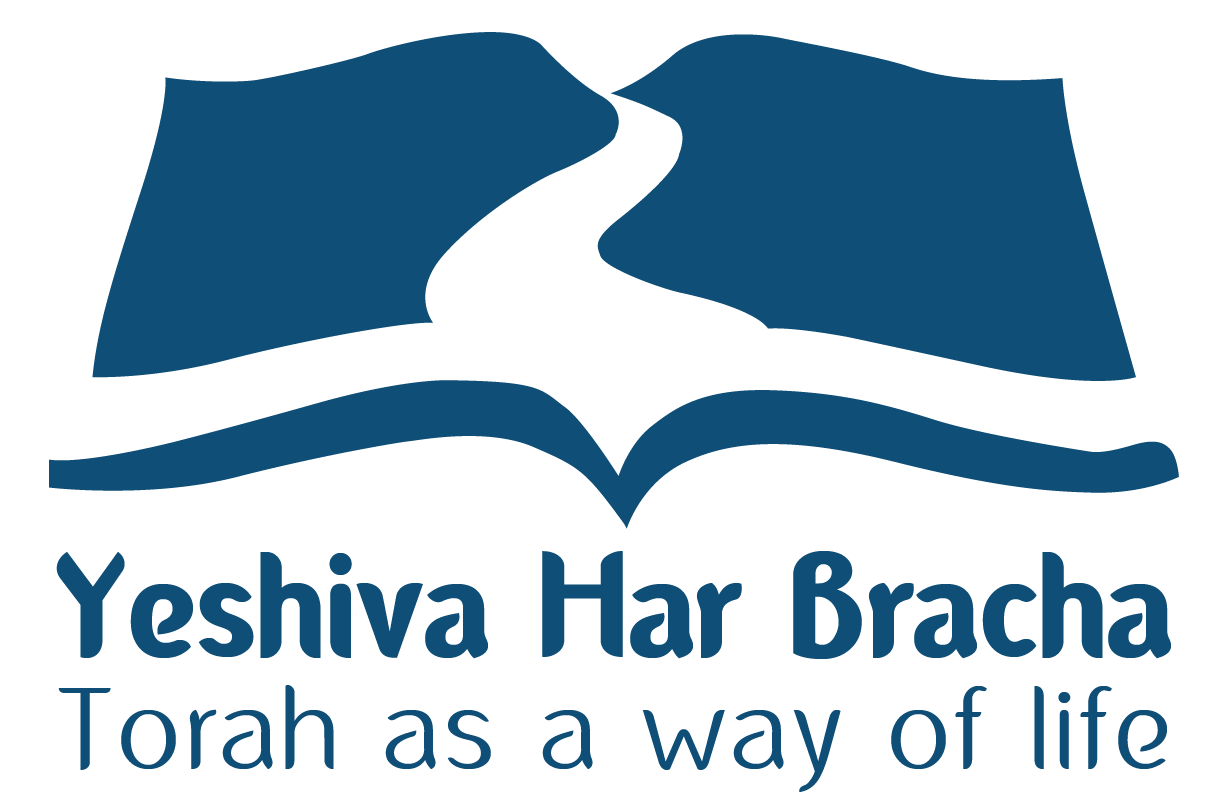The engagement in settlement of the world is the purpose of man ● Every construction of a new house in Israel is a further stage in the redemption ● Our Sages provided examples of things prohibited under the prohibition of ‘divination’ ● The general rule is that any superstitious belief that lacks a logical basis is forbidden by the Torah due to ‘divination’ ● Some poskim believe that any custom observed even by God-fearing Jews, may be taken into consideration ● However, in practice, it is forbidden to concern oneself with such customs based on ‘superstitions’ ● One should not reprimand those who observe them, as they have halachic opinions to rely on
Inauguration of a New Neighborhood in Har Bracha
On Sunday, Isru Chag, the day after Passover, we were blessed to celebrate the inauguration of the ‘Tzurim Bet’ neighborhood in Har Bracha, where four six-story buildings containing 80 large apartments were built. The festivities were attended by residents of the community, my father, Rabbi Zalman Baruch Melamed, and mother, Rabbanit Shulamit, Defense Minister Israel Katz, Justice Minister Yariv Levin, ministers involved in strengthening settlement, Minister Orit Strook, and Minister Yitzhak Wasserlauf, Chairman of the Foreign Affairs and Defense Committee MK Yuli Edelstein, and Knesset members Amit Halevi, Keti Shitrit, and Ariel Kallner.
These were the words of gratitude and prayer I said at the ceremony:
“It is hard to overstate the joy that is appropriate to feel for the inauguration of the neighborhood. It is both a commandment, and redemption. A commandment, as our Sages have said that the commandment of settling the Land of Israel is equal to all the commandments in the Torah. Firstly, because engagement in settlement of the world is the purpose of man, who was created in the image of God ‘to work it, and to guard it’. Beyond that, by settling the Land, the people of Israel can fulfill all commandments properly, and bring blessing and repair to the world.
Therefore, the fulfillment of this commandment is redemption, and as the prophet Isaiah said:
“For you shall burst forth to the right and to the left, and your descendants will inherit nations, and desolate cities they shall inhabit. Fear not, for you will not be ashamed, and do not be confounded, for you will not be put to shame; for the shame of your youth you shall forget, and the reproach of your widowhood you will remember no more. For your Maker is your husband, the Lord of Hosts is His name, and your Redeemer is the Holy One of Israel, God of the whole earth, He is called” (Isaiah 54:3-5).
Based on this prophecy of redemption, our Sages instituted a blessing for seeing houses that redeem the Land from its destruction: ‘Matziv g’vul almanah’ (‘He sets the boundary of the widow.’)
Every construction of a new house in Israel is another stage in redemption, all the more so when it is on the front line of settlement in Har Bracha. It is a tremendous privilege for us that this joy is celebrated in the presence of ministers and Knesset members; each minister and Knesset member adds another unique aspect to the statehood of the occasion, on behalf of the Government of Israel, and on behalf of the Knesset of Israel—after a long exile—we are privileged to return to the Land of our forefathers, and settle it.
On the way to building the ‘Tzurim Bet’ neighborhood, we faced many difficulties, more than the challenges that accompanied previous neighborhoods. However, with God’s help, and through the mobilization of the secretariat, the building committee, and the buyers, we celebrate the completion of the neighborhood. One can appreciate and hope that after we managed to overcome the crises along the way, we can continue to build at double or triple the pace, until we merit to see the settlement transform into a major city in Israel.
May it be God’s will that the houses in the neighborhood be filled with Torah and kindness, as guided by our Sages in Pirkei Avot (1:4-5): ‘Let your house be a meeting place for the wise,’ ‘Let your house be open wide, and let the needy be members of your household.’ May it be God’s will that magnificent families live in these houses, raising sons and daughters engaged in Torah and commandments. From these houses, parents will accompany their children to military service, in prayer that they will succeed, and return safely. From these homes, parents will accompany their children to the chuppah (wedding canopy), praying that they too will merit to establish splendid families, settle the Land, and add goodness and blessing to the People of Israel, and to the entire world.”
Prohibition of Superstitious Customs
A few months ago, I wrote that it is forbidden to observe customs rooted in superstition due to the prohibition of “nichush” (divination). For example:
- Those who consider a black cat crossing their path as a bad omen and, as a result, change their route out of fear of danger.
- Those who fear that returning home immediately after leaving, brings bad luck. If they forget something, they ask someone else to bring it out to them, or take a detour before re-entering.
- Those who avoid whistling at home, fearing it will lead to financial loss.
- Those who avoid sitting at the corner of a table, believing it will prevent marriage for seven years.
Similarly, some avoid stepping over a baby or child, fearing it will hinder their development. Others are very cautious about breaking a mirror. Some wear a red string as a charm. Anyone who fears such things violates the prohibition of “nichush“.
Question about the Permissive Opinion
Some have asked how I could straightforwardly state that these customs are forbidden, given that some are mentioned in rabbinic texts. For example:
- In the will of Rabbi Yehuda HaChassid (section 43), it states that one who leaves home and forgets something should not return, but should ask someone else to bring it out. This is cited in Kaf HaChaim (Orach Chaim 110:21).
- Some derive from the Rashba that one should observe the customs of elders, even if their reasons are unknown (Responsa 1:9).
Based on this, additional concerns have been noted:
- Responsa Minchat Yitzchak (9:8) mentions the custom of not eating the ends of bread.
- Responsa Be’er Moshe (8:36) discusses customs like not allowing a toothless child to look in a mirror, not stepping over a small child lest they not grow, and tying a red string to a baby’s carriage.
Explanation of the Prohibitions of “Nichush” and “Darkei Emori“
Indeed, some poskim believe these customs do not fall under the prohibition of “nichush” and do not classify them as superstitions. However, it appears that in practice, they should be forbidden due to the Torah’s prohibition of “nichush“. I will first explain the prohibition of “nichush” (divination), and from that, the approach to superstitions.
Our Sages (Sanhedrin 65b) provided examples of prohibited “nichush“:
Someone who says, “My bread fell from my mouth,” and because of this, fears harm all day. Or, “if one’s staff falls, a child calls from behind him, a raven caws at him, a deer crosses his path, a snake is on his right, or a fox on his left”, and one sees this as a bad sign, and refrains from traveling or conducting business as planned, they transgress the prohibition of “nichush“.
Similarly, there was also a superstition that paying taxes early in the day, month, or week would lead to business losses. Therefore, someone who tells the tax collector, “Don’t start with me; it’s morning, Rosh Chodesh, or after Shabbat,” transgresses the prohibition of “nichush” (Sanhedrin 66a).
Simply put, the actions detailed by our Sages regarding the prohibition of “divination” (nichush) are merely examples of superstitions lacking logical basis. The general principle is that any superstition without a rational foundation is prohibited by the Torah due to “nichush.” Therefore, just as one who fears a fox crossing on his left violates the prohibition of “nichush” (Sanhedrin 65b), so too does one who fears a black cat crossing his path. Similarly, just as one who refrains from paying taxes at the beginning of the week violates “nichush,” so too does one who avoids sitting at the corner of a table or refrains from returning to a house he has exited.
Some might argue that “nichush” only applies when one refrains from action after seeing something, or to avoid danger. However, it seems more accurate that it includes any action or inaction based on superstition. Therefore, practices forbidden due to “Darkei Emori” (lit., ‘ways of the Amorites’) — customs learned from non-Jews — are also forbidden due to “nichush“.
Our Sages (Shabbat 67b) provided examples of “Darkei Emori“:
- Believing that if a hen crows like a rooster, it’s a bad sign, and to avert it, the hen should be slaughtered.
- Chick breeders who would smash eggs against a wall as a charm for the chicks’ lives.
- Women who danced before chicks and counted 71 of them.
- Women who, while cooking certain dishes, would dance, silence others, or shout, believing it would affect the cooking.
Understanding the Permissive View
However, some poskim believe that any custom observed by God-fearing Jews, is permissible. They base this on the Ramban and other early authorities who held that while consulting astrologers is forbidden, if it’s known that something is considered dangerous according to them, one may be cautious, as sometimes their words hold truth. This is codified in the Shulchan Aruch and Rema (Yoreh De’ah 179:1-2). Therefore, any custom adopted by Jews was believed to have some truth, and is not prohibited as “Darkei Emori” or “Chukot HaGoyim” (Gentile customs).
Practical Halakha
However, it seems that one should not be concerned with these customs based on superstitions. Firstly, according to the Rambam and those who follow his approach — including R’YD, Sefer Mitzvot Gadol, Tur, Kiryat Sefer, and Tiferet Yisrael — it’s forbidden to heed astrologers due to the Torah’s prohibition of “Lo Te’onenu” (do not practice divination). All the aforementioned customs, and other similar ones, are prohibited due to “Me’onen” or “Menachesh“.
Even if we assume that the Ramban and his followers permit caution regarding superstitions, in cases of Torah prohibitions, it’s appropriate to be stringent. Moreover, today, even according to the Ramban and his followers, these customs are forbidden, as they permitted caution only when they believed there was some truth in the astrologers’ and diviners’ words. Now that we know these customs are baseless superstitions, and most were adopted from surrounding non-Jewish cultures, they revert to the status of practices prohibited due to “me’onen” (soothsaying) and “menachesh” (divination). Only if a custom has a moral rationale, may it be observed.
However, one should not rebuke those who follow such customs, as they have halachic sources to rely upon. The less one believes in these practices, the lesser the concern of transgression. Nevertheless, it’s inappropriate to promote caution regarding these customs in books, similar to the guidance of halachic authorities who advised against relying on Talmudic remedies, to avoid casting doubt and criticism upon Torah teachings (Yam Shel Shlomo, Chullin 8:12).
This article appears in the ‘Besheva’ newspaper and was translated from Hebrew.





